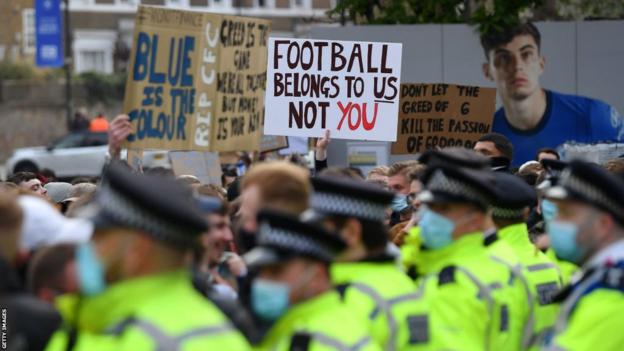David Sullivan: West Ham owner opposes introduction of independent football regulator
Last updated on .From the section Football

West Ham United owner David Sullivan says the Premier League "may cease" to be the world's top division if an independent regulator is introduced.
Such a regulator would be brought in if the Football Governance Bill - which had its first reading in Parliament on Tuesday - is made law.
The UK government announced its plans to appoint a regulator following a fan-led review into football in 2022.
But Sullivan said a regulator is only needed "when things are going badly".
- 'Historic moment for football fans' - bill introduced to establish regulator
- Premier League parachute payments gap 'a major concern' says EFL
One of the key roles of the regulator would be to find an agreement between the Premier League and the English Football League (EFL) over financial distributions.
With no agreement in sight, the EFL has said action from an independent regulator is "more important than ever".
"The Premier League is the top league in the world," Sullivan told BBC Sport.
"It is a big export - other countries want to buy it off us and we do very well in Europe generally.
"Anything to water down our income will make us less competitive. We may cease to be the top league so they may ruin an asset that we have."
However, EFL chairman Rick Parry said: "Nothing is going to change the competitiveness of the Premier League.
"The gap [in terms of wages paid] is just getting bigger and bigger between the Premier League and the rest [of Europe], so the idea that the Premier League is going to be unduly constrained or no longer competitive, I just don't even see how that argument gets to first base."
The fan-led review, which followed on from the failed launch of a European Super League in 2021, made 10 recommendations to government on how to improve football.
Powers handed to the regulator will centre around three main objectives: improving financial sustainability of clubs, ensuring financial resilience across the leagues and safeguarding English football's heritage.
Sullivan, who initially bought a stake in West Ham in 2010, said the government's track record with regulators is "appalling".
"You tend to put a regulator in when things are going very badly and something has to be done to sort it out. We have the best football in the world," he added.
What does the bill say?
New club owners and directors will face stronger tests to help prevent the possibility of them putting clubs out of business, as was the case with Bury and Macclesfield, while a licensing system covering clubs from the National League up to the Premier League has been proposed.
As part of their licence, clubs will be required to consult their fans on key off-field decisions, such as club heritage and its strategic direction.
The regulator may also step in if the Premier League and the EFL reach no agreement over how Premier League money is distributed across the football pyramid in England.
So far, the two parties have failed to agree on a 'new deal' and the regulator will have new backstop powers to resolve that issue.
The government has long warned the football authorities that an independent football regulator would have such powers to intervene.
"You have two problems - what we give and who funds it?" Sullivan said.
"There is a big argument between the bottom 10, who want the top clubs to pay a lot more, and the top clubs want everyone to pay the same.
"Whatever we give won't be enough for them [the EFL]. Tesco don't give the small supermarket chain a subsidy."
The Premier League does provide funding to some clubs in the Championship via parachute payments, which were introduced in 2006-07 to limit the financial damage a relegated team might endure when dropping down.
Those payments to each of the three relegated clubs are issued in declining instalments over three seasons.
Sullivan feels parachute payments are "not big enough" to help support clubs who suffer relegation, and says dropping out of the top flight would be "horrendous" for West Ham after 12 successive seasons in the Premier League.
"We don't think that parachute payments are the right mechanism. They obviously indicate there's a problem but they tackle the symptoms," EFL chief Parry said.
"We don't want clubs facing financial catastrophe - either on the way up or on the way down. "What we've always said is we want to address the cliff edge - the gap between the Premier League and the Championship. For the non-parachute clubs, that £100m-plus. That's the gap that is unbridgeable and challenging.
"We've always said we think that gap should be halved, and if we halve that, then we don't need the parachute payments."

- Our coverage of your Premier League club is bigger and better than ever before - follow your team and sign up for notifications in the BBC Sport app to make sure you never miss a moment






















